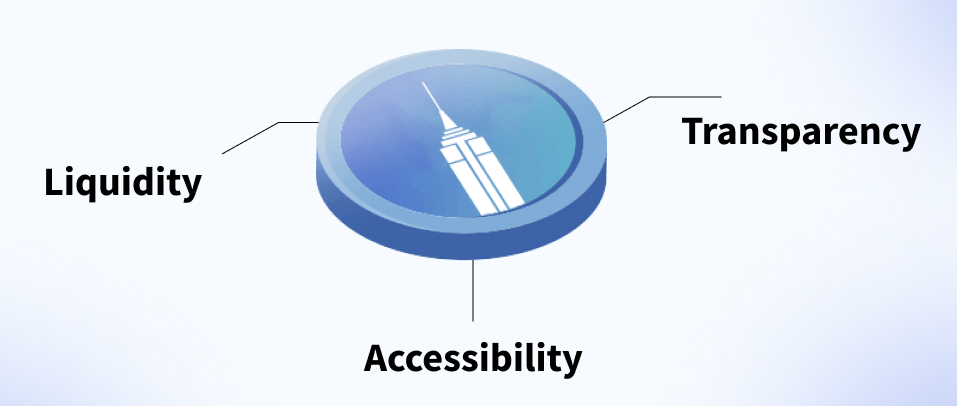Table of Contents
- Introduction: The Evolution of Real Estate Investment
- Understanding Real Estate Tokenization
- The Integration of DeFi in Real Estate
- Benefits of Tokenized Real Estate
- DeFi Yield Opportunities in Real Estate
- Future Outlook and Challenges
Introduction: The Evolution of Real Estate Investment
For generations, real estate has been viewed as one of the most reliable paths to building wealth. However, the traditional real estate market has always had one significant drawback: it’s largely inaccessible to the average investor. High entry costs, complex legal requirements, and the need for substantial capital have kept many potential investors from participating in this lucrative market. But now, we’re witnessing a revolutionary change in how people can invest in real estate, thanks to the emergence of blockchain technology and decentralized finance (DeFi).
Suggested : What is RWA Tokenization and how does it work?
Understanding Real Estate Tokenization
Real estate tokenization represents a groundbreaking approach to property ownership. At its core, tokenization is the process of converting rights to a property into digital tokens on a blockchain network. Think of it as dividing a property into thousands of digital shares, but with much more flexibility and functionality than traditional real estate investment trusts (REITs).
The tokenization process is both sophisticated and straightforward. When a property is selected for tokenization, it first undergoes a thorough legal and financial assessment. This includes property valuation, legal structuring, and ensuring compliance with local regulations. Once these foundations are in place, smart contracts are created to govern the rights and responsibilities associated with token ownership.
These smart contracts are essentially self-executing agreements that automatically handle various aspects of property management, including distribution of rental income, voting rights for property decisions, and transfer of ownership. Each token represents a fixed portion of the underlying property, and these tokens can be bought, sold, or traded on various platforms.
The Integration of DeFi in Real Estate
The marriage of DeFi and real estate tokenization has created an ecosystem that goes far beyond simple property ownership. DeFi protocols have introduced sophisticated financial instruments and services that were previously impossible in traditional real estate markets.
Imagine being able to use your property investment as collateral for a loan without any paperwork or bank approvals. That’s exactly what DeFi protocols enable. Through smart contracts, property token holders can instantly access lending platforms where they can borrow against their tokens. These loans are processed automatically, with terms and conditions executed by code rather than human intermediaries.
The DeFi ecosystem also introduces concepts like liquidity pools for real estate tokens. These pools allow investors to trade tokens instantly, solving one of the biggest challenges in traditional real estate – illiquidity. Property owners can now convert their real estate investments into cash within minutes, rather than waiting months for a traditional sale to complete.
Benefits of Tokenized Real Estate
The transformation brought about by tokenization and DeFi extends far beyond just making real estate more accessible. Let’s explore the profound impact this technology has on property investment.
The most immediate benefit is enhanced accessibility. Instead of needing hundreds of thousands of dollars to invest in property, investors can start with much smaller amounts. This democratization of real estate investment means that more people can participate in property markets, diversifying their investment portfolios without overextending themselves financially.
Liquidity, traditionally real estate’s biggest drawback, is revolutionized through tokenization. The ability to trade property tokens 24/7 on digital platforms means investors are no longer locked into long-term commitments. Need to sell just 20% of your property investment? Now you can, without affecting the rest of your holding. This flexibility was unimaginable in traditional real estate markets.
Transparency in real estate transactions reaches new heights with blockchain technology. Every transaction, ownership transfer, and income distribution is recorded on an immutable ledger. This eliminates the need for trust in intermediaries and reduces the risk of fraud. Property details, ownership history, and financial performance are all accessible to token holders, providing unprecedented transparency in real estate investment.

DeFi Yield Opportunities in Real Estate
The integration of DeFi protocols with tokenized real estate has created exciting new ways to generate returns from property investments. These opportunities go well beyond traditional rental income and property appreciation.
The most straightforward yield opportunity comes from rental income, which is distributed automatically through smart contracts. Token holders receive their share of rental payments based on their ownership percentage, without the need for property managers or other intermediaries to handle the distribution.
Liquidity mining represents an innovative way to earn additional returns. When investors provide their property tokens to liquidity pools on decentralized exchanges, they earn rewards in multiple ways. First, they collect a share of the trading fees generated by other users trading these tokens. Additionally, many platforms offer extra incentives in the form of governance tokens or other rewards for providing liquidity.
Staking programs allow property token holders to earn additional yields by locking up their tokens for a specified period. This helps stabilize the token price and provides token holders with extra returns on top of their regular rental income. The staking rewards often come in the form of platform tokens, which can be traded or used for governance purposes.
Perhaps the most innovative yield opportunity comes from using property tokens as collateral for loans. Investors can borrow against their property tokens without selling them, accessing capital while maintaining their exposure to the property’s potential appreciation. These loans often come with lower interest rates than traditional property loans due to the efficiency of DeFi protocols and the liquid nature of the collateral.
Future Outlook and Challenges
While the potential of tokenized real estate and DeFi is enormous, it’s important to acknowledge the challenges this emerging sector faces. The regulatory landscape remains complex and uncertain in many jurisdictions. Questions about securities laws, cross-border transactions, and investor protection need to be addressed as the industry matures.
Technical challenges also exist, particularly around smart contract security and the reliability of property valuation oracles. The industry needs to continue investing in robust security measures and developing standardized practices for property valuation in the digital age.
Market adoption presents another hurdle. Traditional real estate investors and institutions need time to understand and trust these new technologies. Education and awareness-building are crucial for widespread adoption. However, as more success stories emerge and the benefits become increasingly clear, we’re likely to see accelerating adoption of these technologies.
Despite these challenges, the future of tokenized real estate in DeFi looks incredibly promising. The efficiency gains, increased accessibility, and new yield opportunities are too significant to ignore. As regulatory frameworks mature and technology continues to evolve, we’re likely to see even more innovative solutions that bridge the gap between traditional real estate and decentralized finance.
Conclusion
The combination of real estate tokenization and DeFi represents more than just a technological advancement – it’s a fundamental reimagining of how property investment works. By removing traditional barriers to entry, increasing liquidity, and creating new yield opportunities, this innovation is making real estate investment more accessible and profitable than ever before.
As we look to the future, it’s clear that tokenized real estate and DeFi yields will play an increasingly important role in both the real estate market and the broader financial ecosystem. While challenges remain, the potential benefits far outweigh the obstacles, and we’re likely witnessing the early stages of a transformation that will reshape property investment for generations to come.
Stay updated on everything RWA by following us on our socials :







